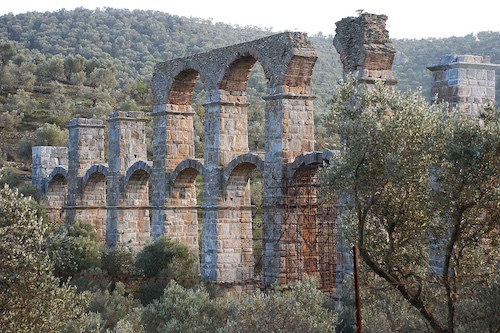(Aqueduct of Moria, Lesvos)
Many major cities around the world were founded next to powerful waterways, such as Paris along the Seine, Istanbul along the Bosphorus, and Cairo along the Nile. The ancient Greeks however didn’t trust rivers that much and built their cities on top of mountains and hills which forced them to creatively seek access to water. This way the ancient Greeks were the first to equip their settlements with water systems and sewer pipes.
They built aqueducts and wells and laid out ingenious waterways. Today that knowledge would be very useful as there is a severe drought in Greece (parts of Crete, the Peloponnese, eastern Macedonia, Thrace, and Lesvos are the worst affected). This drought didn’t just come out of nowhere. For the third year running, sad olive trees are dropping their dried-up fruits and pine trees are holding their breath: they suffer from lack of moisture but are also wary of the wildfires that have free rein during the drought.
Everything is attributed to climate change, a natural phenomenon that we are trying to contain, but are failing to do so. As early as the last century, temperatures began to rise slightly and the number of raindrops decreased. In the twentieth century, several regions and islands in Greece became from humid to semi-humid or worse, especially in the years 1987 to 1997, when there was also a major water shortage. Greece should have been prepared for the drought a long time ago.
In ancient times, when politicians still listened to philosophers and scientist, various underground earthenware pipes ran to Molyvos. Supported by a stone tower and other ingenious structures they ensured a powerful gush of water from the mountain range that runs from Argenos towards Mythimna. Back then, the Greeks were wise and knew how to supply cities and villages with water; whereas this past summer Lesvos failed to get this essential liquid to flow from the taps in Polichnitos.
The current rulers only listen to big money and have no idea how to think ahead. And so water management continues to fail; households are using more and more water, and the exploding tourism industry is not being contained in the slightest. Tourists are demanding more and more luxury, including water-guzzling swimming pools – as if the sea isn’t enough. However, it is the farmers who are consuming the majority of the water and bringing the groundwater level to disastrous lows.
I do not trust modern Greeks that much anymore: they can’t even maintain the roads here on the island, while the aqueducts built by the Romans in the second or third century to supply Mytilene have stood the test of time reasonably well. Perhaps they would even still be functioning if the Ottomans in the early 19th century had not started draining Megali Limni (the source of all that water).
Nowadays, politicians proudly congratulate themselves at openings of yet another project that will have earned various people a tidy sum. But if that project fails, there is no one left to look after it. An example being the water reservoir near Molyvos has long been left to the birds. Now the island is coming up with another new megalomaniac project: the Tsikno Dam in the mountains between Stipsi and Kalloni. That might provide Mytilini with water, but the ecological consequences in the mountains and around the salt pans and wetlands of Kalloni could be catastrophic. And then it’s not even certain that by the time the dam is finished, there will still be enough rain to fill the reservoir. Perhaps undoing the work of the Ottomans and restoring the Roman aqueducts would have been a lot smarter (like they do in Athens).
The fact is that water is becoming increasingly scarce, not only in Greece, but also worldwide. It could cause a first water war in North Africa: Ethiopia has built a massive dam that will divert a significant amount of water from the Nile, which is also an important source of nourishment for downstream countries like Sudan, but especially for Egypt, who is furious.
The days of city states are over, so Kalloni cannot declare war on Mytilene over the Tsikno Dam. The only weapon they can bring to the fight is to consult with as many experts as possible and to come up with sensible solutions to deal with the water shortage. They can educate citizens about preventing waste of water and cease permissions for more swimming pools. Different times call for different measures, for tourists, but also for wealthy investors who act like God.











